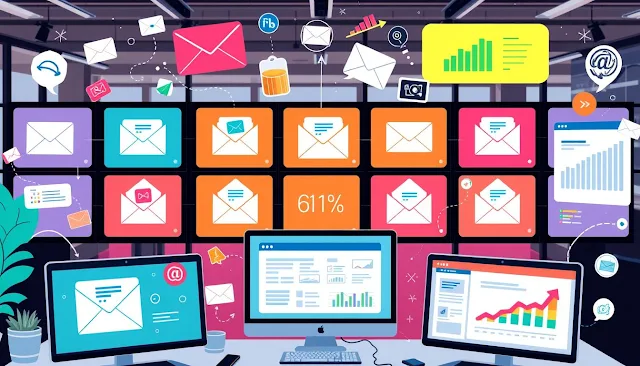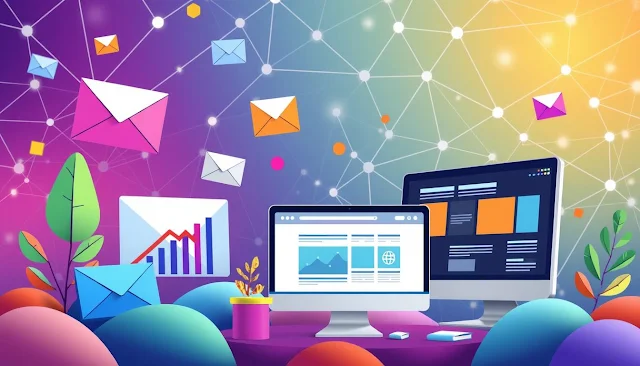Is email marketing legit?

Is email marketing legit?
Absolutely. Email marketing continues to perform well this year. It remains a trustworthy and impactful method for connecting with your audience, delivering strong results at a low cost. It drives engagement and boosts revenue for businesses across various sectors. As 2024 unfolds, understanding email marketing becomes even more critical. Here’s why it’s essential.

Email marketing plays a key role in engaging your audience. It allows businesses to connect with customers, showcase products, and create lasting relationships. To succeed in email marketing, grasp the basics. It goes beyond merely sending messages; it’s about fostering connections and nurturing growth.
Meaning and relevance are central to email marketing. It focuses on sending targeted emails to consumers or prospects. Newsletters, promotions, and personalized communications enhance loyalty and lead generation. Email marketing strengthens subscriber relationships by favoring direct communication over social media. Many organizations see revenue growth through email campaigns.
Enhancing Brand Visibility: Email keeps your brand front and center. It also allows for in-depth performance tracking, unlike some other marketing methods. Companies can analyze metrics like open rates and click-through rates to gauge effectiveness.
History and Evolution: While email marketing isn’t new, it has evolved significantly. Businesses recognized its potential for customer engagement in the 1990s, following its inception in the 1970s. The rise of spam led to the creation of the CAN-SPAM Act, which governs email marketing practices. Technology now enables businesses to customize their messaging, improving engagement. Automation makes communication efficient and precise, while interactive elements like surveys and videos enhance emails. Marketers must adapt to ongoing technology changes and shifting consumer expectations.
Email marketing remains a powerful tool for audience engagement. Evaluating its legitimacy requires considering regulations and ethics. Trust is crucial in email marketing, especially as compliance expectations evolve and consumers become more aware.
Legal Framework and Guidelines: Email regulations safeguard consumer rights and outline marketing principles. The CAN-SPAM Act of 2003 prohibits unsolicited commercial emails, requiring marketers to provide opt-out options, use clear subject lines, and label promotional messages. Violations can result in hefty fines. Since 2018, companies reaching EU residents must adhere to GDPR, which grants individuals control over their data and mandates explicit consent for marketing communications. Organizations should make the opt-out process straightforward so they comply with these stringent regulations. Following these guidelines not only protects consumers but also reinforces email marketing as an ethical practice, fostering audience trust.
Fundamentals of Ethical Email Marketing: Ethical practices enhance trust in email marketing. Obtaining consent before sending emails is vital. Protecting consumer privacy is essential for nurturing positive relationships. Request consent during the signup process with a straightforward checkbox, specifying what subscribers can expect. Clear communication about promotions, newsletters, and updates builds confidence and sets proper expectations.

Privacy: Safeguard subscriber data by being transparent about data collection, storage, and usage. Ensure your website’s privacy policy is easily accessible. Regularly clean your email list to remove inactive subscribers and those who opt out. This practice maintains list health and engagement. Adhering to ethical standards helps build trust and enhances marketing efforts.
The True Advantages of Email Marketing: Email marketing offers numerous benefits for businesses. Engagement: Genuine email marketing fosters strong customer relationships. Tailored content captivates readers. Targeted campaigns lead to higher conversion rates, as customers are more likely to purchase when messages align with their interests. Providing valuable content while respecting privacy builds customer loyalty.
Email marketing is also cost-effective, often yielding high returns on investment, making it appealing to companies of all sizes. Authenticity is key to cultivating trust, fostering engagement, and driving success.
Common Misunderstandings: Effective email marketing can be hampered by misconceptions. It’s important to clarify these myths. Some label email marketing as spam, conflating it with unsolicited messages packed with irrelevant promotions. Genuine email marketing focuses on building relationships with interested subscribers. To avoid spam filters, always seek permission before sending emails. Your audience will look forward to your messages. Segment your list and personalize communications for different groups. Relevant content increases engagement and reduces the likelihood of spam classification.
Another misconception is that email marketing is outdated. Some argue it’s ineffective in today’s fast-paced world. However, email remains a crucial communication tool. It provides immediate access to information. Emails garner more attention than social media posts in crowded feeds. Personalization is straightforward with current technology, enhancing engagement by tailoring content to user preferences. Studies show email marketing often results in higher ROI than other methods, demonstrating its ongoing effectiveness in generating strong returns.
Is email marketing suitable for all businesses? Yes, it benefits companies of all sizes and industries. Success hinges on having a clear strategy and understanding your audience. One-size-fits-all approaches can be detrimental. Knowing your audience’s demographics, preferences, and behaviors is essential for crafting engaging content. Develop a strategy that includes audience segmentation, goal-setting, content scheduling, and defining success metrics.
Emphasize Quality: More emails don’t equate to better results. Instead of flooding inboxes with bland content, focus on creating engaging messages. Any business can utilize email marketing, but it requires a well-thought-out strategy and a deep understanding of its audience.
Successful Email Marketing Strategies for 2024: Email marketing flourishes with thoughtful planning, adherence to regulations, and creativity. Enhance your email campaigns with these tactics. High-quality email lists are vital. Identifying your ideal audience is just as important as having subscribers. Ensure you prominently display clear, appealing opt-in forms on your website, social media, and during checkout to attract new subscribers. Phrases like “Join our community for exclusive offers” can increase sign-ups. Offering incentives such as discounts, eBooks, or unique content can also boost membership. Immediate rewards encourage email signups.
Segment your audience based on demographics, interests, or purchasing behavior to make communications relevant. Ensure compliance with CAN-SPAM and GDPR regulations, which include obtaining explicit consent before sending emails and providing simple opt-out options. These practices foster trust and ensure legal compliance.
Once you’ve established your list, create compelling content and engage with your subscribers. The quality of your email content significantly influences open, click, and conversion rates. Craft enticing subject lines that are concise, engaging, and clear. Experiment with different subject lines to determine what resonates best with your audience. Personalize your emails by using recipient names and recommending items based on their browsing or purchasing history. Valuable emails should offer insights, practical advice, enticing offers, and captivating narratives that align with your audience’s interests. Each email should include a clear call to action that encourages readers to explore further or take advantage of your offer.

Campaign Analysis and Improvement: Email marketing demands ongoing assessment. Monitoring metrics helps refine strategies and performance. Track open rates, click-through rates, conversions, and unsubscribes to gain insight into your email effectiveness. A/B testing can help identify the most effective subject lines, content layouts, and calls to action. Maintain successful strategies while adjusting or discarding those that underperform. Gathering subscriber feedback through surveys or email inquiries can uncover preferences and guide future adjustments. Regularly purging inactive subscribers will enhance your sender reputation and overall engagement.
Adapting Email Marketing: In 2024, email marketing will continue to evolve to better serve businesses and consumers. As technology and consumer behaviors change, this reliable marketing channel will become even more effective. Innovations in AI and automation will help create targeted and impactful campaigns. Machine learning algorithms will allow for personalized email content based on user interactions, creating tailored experiences for each subscriber. Email campaigns will increasingly anticipate preferences drawn from past behavior.
Personalize your email marketing with automated segmentation, ensuring the right messages reach the right audiences. Targeted strategies will enhance engagement and outcomes. Real-time optimization through AI enables marketers to modify strategies based on performance feedback, such as experimenting with subject lines to increase open rates. Interactive elements like surveys, polls, and videos will become more common, capturing audience attention and encouraging participation.
Key Essentials for Effective Email Marketing: New trends in email marketing are enhancing its effectiveness. Hyper-personalization: Companies are focusing on customizing content for individual customers. People prefer personalized messages. Emphasizing Privacy: With GDPR and heightened consumer awareness regarding privacy, marketers must prioritize data protection and transparency. Ethical data practices strengthen trust.
First-party Data: With increasing cookie restrictions, companies are relying on their email list data to inform campaigns. Responsible data usage connects communications to consumer needs. Mobile Optimization: As over half of email interactions occur on mobile devices, marketers should ensure their emails are visually appealing and simple to navigate on smaller screens, complete with clear calls to action. As sustainability becomes a growing concern, marketing efforts that highlight eco-friendly products or reduce paper waste can resonate with socially conscious consumers.
In summary, email marketing remains effective in 2024. It should concentrate on relationship building and delivering value, steering clear of spam tactics. Success relies on permission-based lists, relevant content, and nurturing lasting connections. By adhering to regulations and ethical practices, companies can enhance their reputation while increasing ROI and consumer confidence. Reflect on how email fits into your marketing strategy. What tactics will you employ to elevate your email campaigns?
Boosting audience engagement leads to higher conversions and customer loyalty. Email marketing is integral to business success. While social media and instant messaging often overshadow it, email campaigns can be among the most powerful tools for reaching your audience. Tailoring communications for various customer segments helps create memorable experiences, increasing both open and click-through rates, along with conversions.
Email marketing elevates product visibility and strengthens customer relationships. Provide relevant content, exclusive incentives, and insider knowledge to foster brand loyalty and encourage repeat business. The numerous benefits of email marketing, coupled with its low cost and high ROI, make it stand out as a marketing strategy. As you refine your email campaigns, you’ll discover innovative ways to engage your audience. Compelling content, storytelling techniques, and targeted marketing strategies offer endless opportunities for interaction.
In conclusion, email marketing remains a reliable and effective tool, despite evolving marketing trends. Any marketing plan should incorporate email to enhance relationships, drive conversions, and retain customers. Assess your current email strategies and seek areas for improvement. Building customer connections through email marketing is a straightforward and personal method that drives sales and encourages loyalty. Personalized emails that resonate with consumer interests and behaviors lead to happier customers. Rather than simply sending emails, invest time in understanding your audience and refining your strategy for optimal outcomes.
To maximize the effectiveness of email marketing, continuously evaluate and enhance your approach. Are you effectively segmenting your audience? Organizing your email list by demographics, purchasing patterns, or engagement levels ensures your message is relevant. Personalizing subject lines, employing dynamic content, and offering tailored deals can significantly boost open rates and conversions, fostering deeper connections with your readers.
We should also rigorously measure campaign performance. Monitoring open rates, click-through rates, and conversions is vital for assessing success and identifying areas for growth. Testing different subject lines and calls to action helps determine the most effective techniques for engagement. Continuous improvement is key to enhancing email marketing and driving business growth. Put quality above quantity; engaging subscribers and valuable content will guarantee the visibility and appreciation of your messages. Fostering genuine relationships rather than simply sending out promotions will cultivate a loyal audience that eagerly anticipates your emails, making electronic marketing an essential component of your strategy.